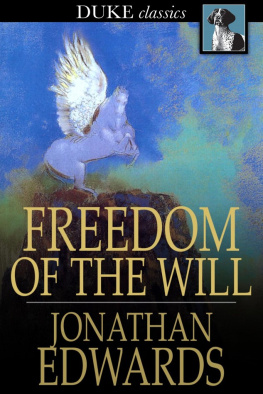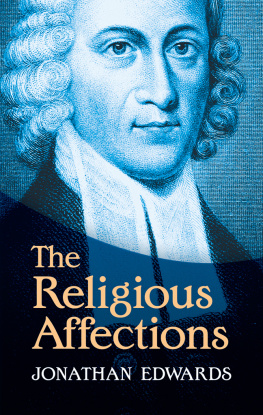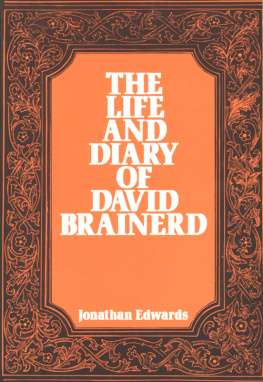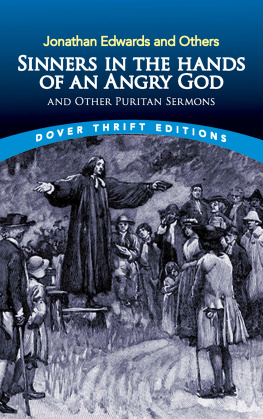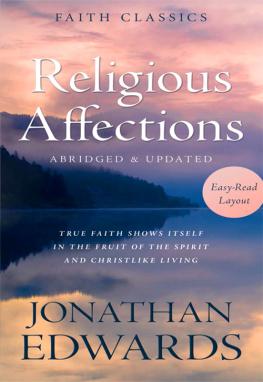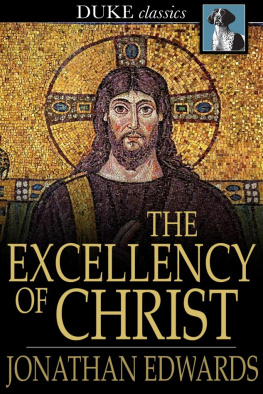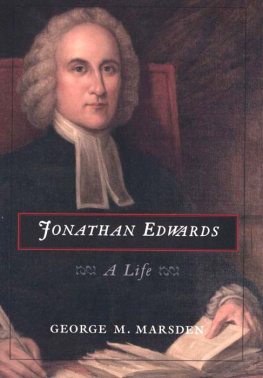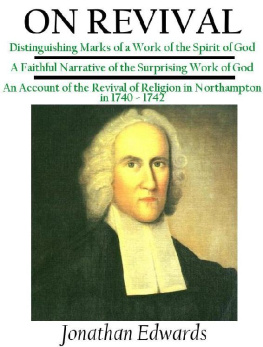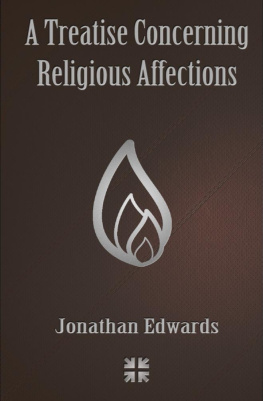Jonathan Edwards - Freedom of the Will
Here you can read online Jonathan Edwards - Freedom of the Will full text of the book (entire story) in english for free. Download pdf and epub, get meaning, cover and reviews about this ebook. publisher: Duke Classics, genre: Science. Description of the work, (preface) as well as reviews are available. Best literature library LitArk.com created for fans of good reading and offers a wide selection of genres:
Romance novel
Science fiction
Adventure
Detective
Science
History
Home and family
Prose
Art
Politics
Computer
Non-fiction
Religion
Business
Children
Humor
Choose a favorite category and find really read worthwhile books. Enjoy immersion in the world of imagination, feel the emotions of the characters or learn something new for yourself, make an fascinating discovery.
- Book:Freedom of the Will
- Author:
- Publisher:Duke Classics
- Genre:
- Rating:3 / 5
- Favourites:Add to favourites
- Your mark:
- 60
- 1
- 2
- 3
- 4
- 5
Freedom of the Will: summary, description and annotation
We offer to read an annotation, description, summary or preface (depends on what the author of the book "Freedom of the Will" wrote himself). If you haven't found the necessary information about the book — write in the comments, we will try to find it.
What does it really mean to be possessed of free will? Why is this issue one of the most prominent points of divergence between the various Christian sects and traditions? In Freedom of the Will, leading thinker and theologian Jonathan Edwards offers a comprehensive take on this complex doctrine, addressing free wills relevance to Christianity and other religious faiths.
Freedom of the Will — read online for free the complete book (whole text) full work
Below is the text of the book, divided by pages. System saving the place of the last page read, allows you to conveniently read the book "Freedom of the Will" online for free, without having to search again every time where you left off. Put a bookmark, and you can go to the page where you finished reading at any time.
Font size:
Interval:
Bookmark:

From a 1754 edition
ISBN 978-1-62011-404-9
Duke Classics
2012 Duke Classics and its licensors. All rights reserved.
While every effort has been used to ensure the accuracy and reliability of the information contained in this edition, Duke Classics does not assume liability or responsibility for any errors or omissions in this book. Duke Classics does not accept responsibility for loss suffered as a result of reliance upon the accuracy or currency of information contained in this book.
Concerning the Nature of the Will.
IT may possibly be thought, that there is no great need of going aboutto define or describe the Will; this word being generally as wellunderstood as any other words we can use to explain it: and so perhapsit would be, had not philosophers, metaphysicians, and polemic divines,brought the matter into obscurity by the things they have said of it.But since it is so, I think it may be of some use, and will tend togreater clearness in The following discourse, to say a few thingsconcerning it.
And therefore I observe, that the Will (without any metaphysicalrefining) is, That by which the mind chooses any thing. The faculty ofthe will, is that power, or principle of mind, by which it is capableof choosing: an act of the will is the same as an act of choosing orchoice.
If any think it is a more perfect definition of the will, to say, thatit is that by which the soul either chooses or refuses, I am contentwith it; though I think it enough to say, it is that by which the soulchooses: for in every act of will whatsoever, the mind chooses onething rather than another; it chooses something rather than thecontrary or rather than the want or non-existence of that thing. So inevery act of refusal, the mind chooses the absence of the thingrefused; the positive and the negative are set before the mind for itschoice, and it chooses the negative; and the mind's making its choicein that case is properly the act of the Will: the Will's determiningbetween the two, is a voluntary determination; but that is the samething as making a choice. So that by whatever names we call the act ofthe Will, choosing, refusing, approving, disapproving, liking,disliking, embracing, rejecting, determining, directing, commanding,forbidding, inclining, or being averse, being pleased or displeasedwith; all may be reduced to this of choosing. For the soul to actvoluntarily, is evermore to act electively. Mr. Locke (1) says, "TheWill signifies nothing but a power or ability to prefer or choose."And, in the foregoing page, he says, "The word preferring seems best toexpress the act of volition;" but adds, that "it does it not precisely;for, though a man would prefer flying to walking, yet who can say heever wills it?" But the instance he mentions, does not prove that thereis any thing else in willing, but merely preferring: for it should beconsidered what is the immediate object of the will, with respect to aman's walking, or any other external action; which is not being removedfrom one place to another; on the earth or through the air; these areremoter objects of preference; but such or such an immediate exertionof himself. The thing next chosen, or preferred, when a man wills towalk is not his being removed to such a place where he would be, butsuch an exertion and motion of his legs and feet &c, in order to it.And his willing such an alteration in his body in the present moment,is nothing else but his choosing or preferring such an alteration inhis body at such a moment, or his liking it better than the forbearanceof it. And God has so made and established the human nature, the soulbeing united to a body in proper state that the soul preferring orchoosing such an immediate exertion or alteration of the body, such analteration instantaneously follows. There is nothing else in theactions of my mind, that I am conscious of while I walk, but only mypreferring or choosing, through successive moments that there should besuch alterations of my external sensations and motions; together with aconcurring habitual expectation that it will be so; having ever foundby experience, that on such an immediate preference, such sensationsand motions do actually, instantaneously, and constantly arise. But itis not so in the case of flying; though a man may be said remotely tochoose or prefer flying; yet he does not prefer, or desire, undercircumstances in view, any immediate exertion of the members of hisbody in order to it; because he has no expectation that he shouldobtain the desired end by any such exertion and he does not prefer, orincline to, any bodily exertion under this apprehended circumstance, ofits being wholly in vain. So that if we carefully distinguish theproper objects of the several acts of the will, it will not appear bythis, and such like instances, that there is any difference betweenvolition and preference; or that a man's choosing liking best, or beingpleased with a thing, are not the same with his willing that thing.Thus an act of the will is commonly expressed by its pleasing a man todo thus or thus; and a man doing as he wills, and doing as he pleasesare in common speech the same thing.
Mr. Locke (2) says, "The Will is perfectly distinguished from desire;which in the very same action may have quite contrary tendency fromthat which our wills sets us upon. A man, says he, whom I cannot deny,may oblige me to use persuasions to another, which, at the same time Iam speaking, I may wish not prevail on him. In this case, it is plainthe Will and Desire run counter." I do not suppose, that Will andDesire are words of precisely the same signification: Will seems to bea word of more general signification, extending to things present andabsent. Desire respects something absent. I may prefer my presentsituation and posture, suppose sitting still, or having my eyes open,and so may will it. But yet I cannot think they are so entirelydistinct, that they can ever be properly said to run counter. A mannever, in any instance, wills any thing contrary to his desires, ordesires any thing contrary to his will. The forementioned instance,which Mr. Locke produces, is no proof that he ever does. He may, onsome consideration or other will to utter speeches which have atendency to persuade another and still may desire that they may notpersuade him; but yet his Will and Desire do not run counter all: thething which he wills, the very same he desires; and he does not will athing, and desire the contrary, in any particular. In this instance, itis not carefully observed, what is the thing willed, and what is thething desired: if it were, it would be found, that Will and Desire donot clash in the least. The thing willed on some consideration, is toutter such words; and certainly, the same consideration so influenceshim, that he does not desire the contrary; all things considered, hechooses to utter such words, and does not desire not to utter them. Andso as to the thing which Mr. Locke speaks of as desired, viz. That thewords, though they tend to persuade, should not be effectual to thatend, his Will is not contrary to this; he does not will that theyshould be effectual, but rather wills that they should not, as hedesires. In order to prove that the Will and Desire may run counter, itshould be shown that they may be contrary one to the other in the samething, or with respect to the very same object of Will or Desire: buthere the objects are two; and in each, taken by themselves, the Willand Desire agree. And it is no wonder that they should not agree indifferent things, though but little distinguished in their nature. TheWill may not agree with the Will, nor Desire agree with Desire, indifferent things. As in this very instance which Mr. Locke mentions, aperson may, on some consideration, desire to use persuasions, and atthe same time may desire they may not prevail; but yet nobody will say,that Desire runs counter to Desire; or that this proves that Desire isperfectly a distinct thing from Desire.The like might be observed ofthe other instance Mr. Locke produces, of a man's desiring to be easedof pain, &c
Font size:
Interval:
Bookmark:
Similar books «Freedom of the Will»
Look at similar books to Freedom of the Will. We have selected literature similar in name and meaning in the hope of providing readers with more options to find new, interesting, not yet read works.
Discussion, reviews of the book Freedom of the Will and just readers' own opinions. Leave your comments, write what you think about the work, its meaning or the main characters. Specify what exactly you liked and what you didn't like, and why you think so.

